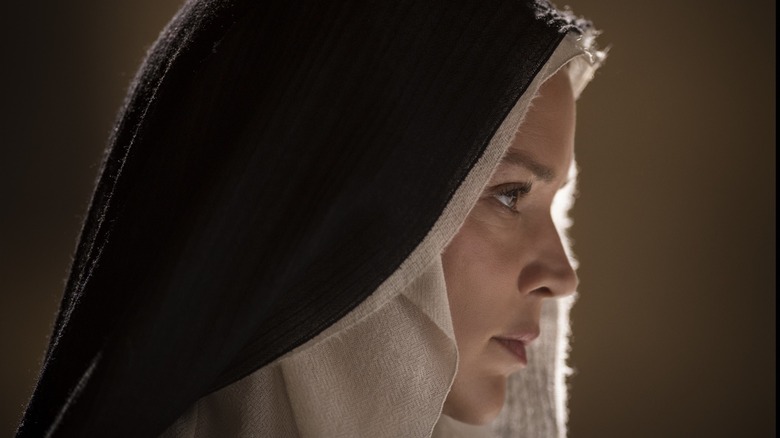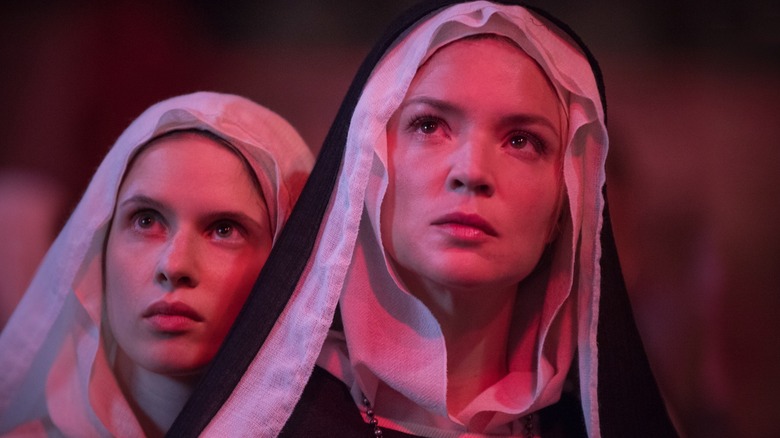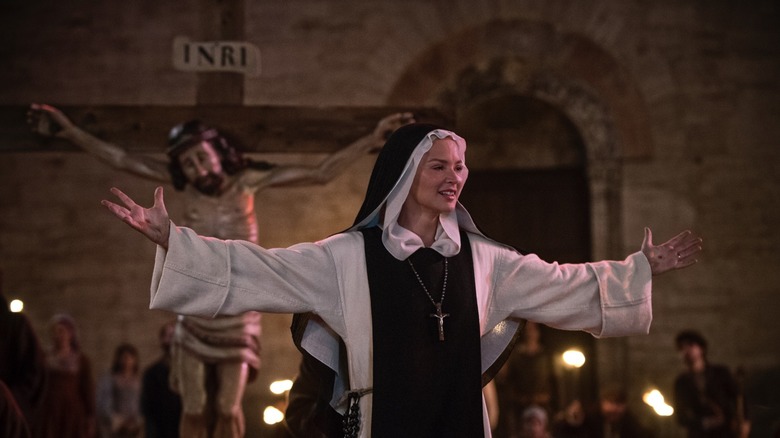Benedetta Review: Trying To Get Chose
There's something undeniably charming about the way director Paul Verhoeven entwines irreverence with his tragicomic exaltation of the reverent in his latest film "Benedetta," a shockingly hilarious picture that brings nunsploitation to the arthouse set. It is by no means a straight comedy, but for a film that feels so heavy, that deals so directly with the ponderous questions of faith and reality, it's a surprise how many moments within its slightly bloated runtime will elicit uproarious laughter. Well, maybe it's only a surprise to anyone who has never seen a Paul Verhoeven film. He may not be operating on the same pop art scale as eternal classics like "RoboCop" or "Starship Troopers," but even his less pulpy exploits have always been typified by a propensity for a boldness that borders on the profane.
The film follows the true story of the titular 17th century nun Benedetta Carlini (Virginie Efira), a woman whose visions and experience of stigmata led her to ascend within her convent until her homosexual exploits with fellow sister Bartolomea (Daphne Patakia) had her position stripped and left her imprisoned for the rest of her life. While "supernaturally gifted nun felled by how much she likes women" may be a reductive way to log-line this one, Benedetta's story, as interpreted by Verhoeven and co-writer David Birke, really is that messy — and that fascinating to behold. Perhaps a stuffier take on the source material might generate fewer headlines about Virgin Mary-shaped sex toys or the film's multiple jokes about flatulence, but Verhoeven's cheekiness here is both deeply entertaining and shockingly effective at exploring his pet themes and his feelings about religion as a whole.
"Benedetta" lacks the provocative edge Verhoeven so deftly displayed in his last outing, "Elle," but it's no less potent for its relatively tame nature. Grading on a curve, this feels like a calmer, more muted version of the filmmaker at work, even if its subject matter may make it seem more controversial than it truly feels.
Jesus' Wives Club
When lil' Benedetta arrives as a child at the convent in Pescia, a small town in Tuscany, the interaction surrounding her entrance into the life of a nun lays bare the inherent hypocrisy of letting humans be the stewards for a higher power. Benedetta's father, in trying to impress upon the Abbess (Charlotte Rampling) how he promised his daughter to God for saving her young life, misunderstands the nature of their meeting. He foolishly thinks the church takes young women in to serve the Lord, not understanding this organization considers themselves matchmakers, intermediaries in the quest to find Jesus more servile brides. But when the Abbess makes it clear a bride of Jesus requires a dowry like any other would-be wife and his tone changes to that of a man finalizing a business deal, she reacts with disgust.
Yes, the transactional nature of their interaction is unsavory, but it's acceptable so long as it's never made explicit.
Benedetta's family encounters a band of thieves before arriving at the convent, a group of marauders she dispenses with by insisting the Virgin Mary speaks to her and hears her calls, an empty threat made real by a passing bird serendipitously defecating on one of the men's faces. But her special connection isn't sufficient to stop her father from being milked by the Abbess in exchange for her new life. She must swap her adoration for this figure she feels closest to for a more rigid yet ever-changing interpretation of the divine from this new institution. Verhoeven chooses to illustrate that paradigm shift and its portentous implications with a young Benedetta being trapped underneath a fallen statue of Mary that should have crushed and killed her, instead landing in such a way her exposed breast is squarely mouth height. The sapphic imagery is so on the nose it's impossible not to laugh at the implied love triangle she finds herself in.
And so, Benedetta's story, as she navigates a life of fealty pledged to a man she doesn't know and cannot see against more nebulous impulses she's as yet unaware of, shifts wildly when she begins to literally see him and feel him in her presence. During the performance of a play with her fellow sisters, Benedetta has an intense vision of a being we can only refer to as Sexy Jesus, for his looks and stature briefly make the film feel like a pornographic parody of the Bible. Her position as one of His brides suddenly feels literal, and these visions begin to intrude more and more as another important figure joins her life.
Bartolomea, a woman who runs away to the convent to escape her abusive family, becomes Benedetta's charge when she begs her father to pay Bartolomea's way into the church. But the temptation she represents when they begin to bond starts to poison her visions of Sexy Jesus, with the interludes becoming more and more garish and brutal.
The ensuing crises she endures through this tumultuous time show the fractured nature of this institution, highlighting that same essential hypocrisy that began Benedetta's life in the church.
Don't shoot the messenger
Benedetta's inner conflict is initially focused around her repressed sexual urges for Bartolomea and what feel to her like visions of Jesus telling her to stop cheating on Him. But when she experiences stigmata, after a whole life of curious visions and near miracles, the surrounding town treats her like a saint and she is set to replace the Abbess as the new Mother Reverend of the convent. With this newfound power, she's free to do whatever she wants with Bartolomea, and the convent must bend around whatever new whim she proclaims, so long as when it comes from her voice, it sounds like the deepened, bass-boosted tenor of the Lord himself speaking through her.
The OG Abbess takes exception to this, knowing the stigmata, or at least elements of it, to be fake. So after a great loss, she enlists the help of the Nuncio from Florence (Lambert Wilson) to prove Benedetta is a blasphemer. But what results is an absurd comedy of errors surrounding the plague, the nature of faith, and — to be frank — which of the duplicitous and power-hungry operators is really the one talking to Jesus. This is never more comically and bluntly displayed than when Benedetta, knowing forces are on the way to question her authority, decrees the convent's gates must be shut to protect everyone inside from the plague, and her men have to argue with the Nuncio about whose orders from God supercede whose.
Benedetta, as the film progresses, becomes a more and more frustrating figure to root for, as the movie truly does devolve into the story of a messy drama queen manipulating a town so she and her girlfriend can do whatever they want. But through Verhoeven's eyes, and to any viewer who has been paying attention, how is that any different from the system of power in place before she so thoroughly and melodramatically upends it?
Efiria and Patakia's chemistry as the romantic leads is palpable, even if their coupling isn't centered like the soft, aspirational sapphic love duos of recent arthouse favorites. But Efiria in particular is strangely compelling as a woman whose understanding of the world around her and how it functions is constantly at odds with her initial naiveté. There's a childlike wonder that never fully leaves her eyes, no matter how tangled the web she weaves becomes, that sort of makes Benedetta seem like a chiller, more friendly, and frequently topless version of HAL 9000, at least in the eyes of the church bureaucracy she confounds at every turn.
That the film's third act hinges on a wooden sex toy as a MacGuffin sounds like a plot point that would be a bug, not a feature, but Verhoeven toes the line so well it never feels that egregious. It's the rare film that mocks organized religion in a way that, while blatantly heretical, feels too charming and well-intentioned to really anger that many folks. Anyone coming for this flick with pitchforks is just missing the point.


